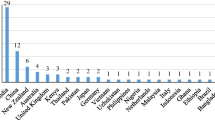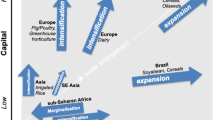Abstract
The analysis of the financialization of food and farming has tended to focus on issues such as the impact on the productive and input sectors of the food chain, including the role of asset management companies, private equity consortia and other financial institutions in acquiring and managing farmland. However, processes of financialization impact along the whole agri-food supply chain, including the retail and food service sectors. This paper analyses the take-over by a private equity company of Somerfield, one of the UK’s leading supermarket chains, and the impact the subsequent restructuring had on the management and organization of the retailer’s operations. In doing so, the paper not only extends the analysis of the effects of financialization on the food system, but also raises questions about the extent to which the supermarkets are the dominant actors in the establishment and management of agri-food supply chains.

Similar content being viewed by others
Notes
At the peak of activity in 2006, by far the greatest number of private equity deals occurred in the US and Great Britain. Of the 1,849 deals which took place in 2006, a little over 60 % were undertaken within these two countries—549 in the US and 617 in the UK. Although there were more transactions in the UK, their total value was only US$47 bll., compared to a total value of US transactions of some US$230 bll. Clearly, the US transactions were larger, but when taken together, US and UK expenditures on private equity deals in 2006 accounted for some 68 % of the world total. See Wright et al. (2007, pp. 16–17).
For example, in 2011, KKR paid US$159 mll. for a 10 % stake in Vietnamese consumer goods producer Masan Consumer, the largest producer of fish, soy and chilli sauces and the second biggest producer of instant noodles in Vietnam, while in 2011 the Carlyle Group acquired a 15 % stake in the Charoen Pokphand Group, Asia’s largest agribusiness concern and the world’s largest producer of animal feed, and the second largest producer of poultry. In 2011, the Carlyle Group also launched its Sub-Saharan Africa Fund, a vehicle for the acquisition of companies in the region. Total funds for private equity activity in Africa increased from US$964 mill. in 2009, to US$1,499 mll. in 2010. In the case of Latin America, the largest farm company in the world (and the world’s largest grain producer)—El Tejar—is owned by the London-based hedge fund Altima Partners (40 %) and the private equity company Capital Group (13 %). El Tejar operates over 2.5 mll. acres of land producing soy beans, corn, sugar and cotton for export to China and elsewhere (see Food Crisis and Global Land Grabs 2010; Reuters 2011; Standard Bank 2011; PoultrySite 2010).
For a considered analysis of all of these issues, see House of Commons Treasury Committee 2007.
The executive summary and working papers of the study are available as addenda to the press release—World Economic Forum (2008b), ‘The global economic impact of global equity investigated in most comprehensive report’, at http://www.weforum.org/en/media/Latest%20Press%20Releases/PrivateEquity_PressRelease.
This is hardly surprising, since the focus on short term gains often implies that private equity companies are not usually committed to the longer term restructuring associated with ‘greenfield’ development.
There is no indication of the direct savings involved in Somerfield’s withdrawal from the ETI, but of course its actions may have been motivated by other cost factors. For example, membership of the ETI did require the company to address issues raised by the NGOs and trade unions which monitored supplier behaviour, which may have constrained the retailer in its efforts to reduce costs by sourcing from cheaper production sites. There are other examples of the parsimonious behaviour engaged in by the private owners of Somerfield—for example, in the case of the collapse of Farepak in October 2006. Farepak was a Christmas savings club in which customers—usually lower income groups—made regular savings in order spread their payments for necessary Christmas purchases, such as food hampers or supermarket vouchers. When the Farepak company went into liquidation, most of the leading retailers and supermarket chains contributed modest sums to a Government-sponsored assistance fund, or agreed to allow individual savers to spend a proportion of their lost savings—usually 25 %—on the goods they needed for Christmas. The only significant exception to this was the Somerfield Group (see Express on Sunday 2006; The Guardian 2006).
References
Accountancy Age. 2006. Small suppliers hit by retailers ‘shocking’ late payment record, 31 August.
Bell, D. 1960. The end of ideology. New York: The Free Press.
Berle, A., and G. Means. 1932. The modern corporation and private property. New York: Harcourt, Brace and World.
BMI Industry Insights. 2008. Company news alert: Somerfield up for auction, 23 January.
Bristol Evening Post. 2006. Poor sellers will be axed, 18 January.
British Broadcasting Corporation. 2008. Discount supermarket sales rise. http://news.bbc.co.uk/2/hi/business/7572199.stm. Accessed 26 Nov 2011.
Burch, D., and G. Lawrence. 2005. Supermarket own brands, supply chains, and the transformation of the agri-food system. International Journal of Sociology of Agriculture and Food 13(1): 1–18.
Burch, D., and G. Lawrence. 2009. Towards a third food regime: Behind the transformation. Agriculture and Human Values 26(4): 267–279.
Burnham, J. 1962. The managerial revolution. Bloomington: Indiana University Press.
Business Week. 2007. The world’s biggest private equity players, 25 June.
Centre for Management Buy-Out Research. 2011. University of Nottingham Business School. http://www.nottingham.ac.uk/business/cmbor/Privateequity.html. Accessed 3 Nov 2011.
Commonwealth of Australia. 2007. Senate standing committee on economics: Private equity investment in Australia. Canberra: Australian Government Publishing Service.
Daily Telegraph. 2007. Private equity: Blackstone ‘realistic’ as credit crunch hits home, 13 August.
Dow Jones Business Week. 2007. Investors see European retailers as hot property, 20 June.
Evening Standard. 2007. Small suppliers reach end of shelf life in Somerfield’s review. 17 January.
Express on Sunday. 2006. Banks have the power to change image, 3 December.
Express on Sunday. 2008. Tycoon aims to check out Somerfield, 20 January.
Financial Times. 2008a. Tchenguiz Consortium to auction Somerfield, 17 January.
Financial Times. 2008b. Somerfield sellers doubled initial investment, 16 July.
Fligstein, N., and L. Markowitz. 1993. Financial reorganisation of American corporations in the 1980s. In Sociology and the public agenda, ed. W. Wilson, 185–206. Beverly Hills: Sage.
Food Crisis and Global Land Grabs. 2010. Brazilian outback lures Argentine farm giant. http://farmlandgrab.org/14579. Accessed 15 Oct 2011.
Galbraith, J. 1967. The new industrial state. London: Hamish Hamilton.
Glyn, A., and B. Sutcliffe. 1972. British capitalism, workers and the profits squeeze. Harmondsworth: Penguin Books.
Hall, D. 2007a. Methodological issues in estimating the impact of private equity buyouts on employment. London: University of Greenwich and UNITE.
Hall, D. 2007b. Unhappy returns to investors in private equity. London: University of Greenwich and UNITE.
Hall, D. 2008. Illusion, reality and spin: Davos, LBOs and job destruction. http://www.iufdocuments.org/buyoutwatch/2008/02/illusion_reality_and_spin_davo.html. Accessed 21 Nov 2011.
House of Commons Treasury Committee. 2007. Private equity, tenth report of session 2006–07, vol. 1. London: The Stationery Office.
InvestAustralia. 2011. Standard chartered private equity to invest $83 million in Australia’s biggest livestock exporter Wellard group. http://farmlandgrab.org/post/view/18193. Accessed 24 Nov 2011.
Jensen, M. 1989. Eclipse of the public corporation. Harvard Business Review. September-October.
Krippner, G. 2005. The financialization of the American economy. Socio-Economic Review 3: 173–208.
Marketing Week. 2008. Co-op’s acquisition of Somerfield: The need for co-operation, 24 July.
Merian Research and CRBM. 2010. The vultures of land grabbing: The involvement of European financial companies in large scale land acquisition abroad. http://www.rinoceros.org/IMG/pdf/VULTURES-completo-2.pdf. Accessed 15 Oct 2010.
Miliband, R. 1973. The state in capitalist society. London: Quartet Books.
New York Times. 2006. Private equity venture struggles to navigate European disdain, 23 November.
Newsquest Media Group. 2006. Staff hit by ‘bolt from the blue’ over jobs, 1 March.
Peston, R. 2007. The failure of capitalism, BBC News, at http://www.bbc.co.uk/blogs/thereporters/robertpeston/2007/02/the_failure_of_capitalism.html. Accessed 20 Nov 2007.
PoultrySite. 2010. Carlyle takes share of CP feed interest in China. http://www.thepoultrysite.com/poultrynews/20492/carlyle-takes-share-of-cp-feed-interest-in-china. Accessed 15 Nov 2010.
Press Association. 2006. Somerfield buyers sell off Kwik-Save brand, 27 February.
Property Week. 2007. Somerfield’s £1.3 bn. supermarket switch, 8 June.
Property Week. 2008. The Tchenguiz formula, 27 June.
Reuters. 2006. Somerfield plans 850 mln. Stg. supermarket bond—S&P, 16 November.
Reuters. 2011. KKR buys 10% of Masan in Vietnam’s largest PE deal. http://www.reuters.com/article/2011/04/13/kkr-vietnam-idUSL3E7FD05920110413. Accessed 15 Oct 2011.
Rossman, P., and G. Greenfield. 2006. Financialization: New routes to profit, new challenges for trade unions. Geneva: Global Labour Institute and the International Union of Food, Agricultural, Hotel, Restaurant, catering, Tobacco and Allied Workers’ Associations.
Sanford, J. 2007. Private equity: The theory. http://www.canadianbusiness.com/. Accessed 20 Nov 2007.
Standard Bank. 2011. Standard Bank Group: Private equity turns to Africa. http://www.standardbank.com/Article.aspx?id=-118&src. Accessed 25 Oct 2011.
Sydney Morning Herald. 2011a. Cashed up private equity to lead surge of acquisitions in 2011. http://www.smh.com.au/business/cashedup-private-equity-to-lead-surge-of-acquisitions-in-2011-20110107-19ipd.html?skin=text-only. Accessed 24 Nov 2011.
Sydney Morning Herald. 2011b. Should Australia be selling the farm? http://www.smh.com.au/national/should-australia-be-selling-the-farm-20110819-1j24e.html. Accessed 24 Nov 2011.
The Co-operative Group. 2011. Ethics in action. http://www.co-operative.coop/corporate/ethicsinaction/. Accessed 26 Nov 2011.
The Globe and Mail. 2007. Liquid enough for you? https://secure.globeadvisor.com/servlet/ArticleNews/story/gam/20070427/ROB5PG58. Accessed 16 Nov 2007.
The Grocer. 2007. Will refinance plan put an end to break-up speculation? 2 June.
The Guardian. 2003. Co-op passes up £4 m to maintain ethics, 6 May.
The Guardian. 2006. The Farepak situation explained, 8 November.
The Guardian. 2007. Trade unions attack ‘corporate greed’ of private equity firms, 26 January.
The Guardian. 2008. Big deals: Meet Robert Tchenguiz, 24 January.
The Guardian. 2011a. Tchenguiz settles dispute with Kaupthing, 20 September.
The Guardian. 2011b. Private equity chief wants profits cap on care-home owners. http://www.guardian.co.uk/business/2011/jul/11/southern-cross-jon-moulton-regulators. Accessed 25 Nov 2011.
The Independent. 2008. Co-op gears up for big 4 battle, 17 July.
The Irish Examiner. 2007. Sainsbury’s shareholder seeks split, 15 April.
The Lawyer. 2007. Value judgement. http://www.thelawyer.com/cgi-bin/item.cgi?id=126434. Accessed 12 Nov 2007.
The Observer. 2006. Business and media: Somerfield gives up on ethics, 7 May.
The Telegraph. 2007. Tchenguiz doubles stake in Sainsbury. http://www.telegraph.co.uk/finance/markets/2811221/Tchenguiz-doubles-stake-in-Sainsbury.html. Accessed 24 Nov 2011.
The Times. 2007. Credit crunch prompts Tchenguiz to sell shares: UK business, 17 November.
The Times. 2008. Tchenguiz and Apax unable to agree as offers for Somerfield fall short, 26 March.
Wall Street Journal. 2005. The new masters of the universe. http://www.bain.com/publications/articles/the-new-masters-of-the-universe.aspx. Accessed 19 Nov 2007.
Western Daily Press. 2006a. Somerfield to cut back on product range, 18 January.
Western Daily Press. 2006b. 500 Jobs to be axed by retail chain, 28 February.
Western Daily Press. 2006c. Somerfield aims to send 140 tech staff to India, 3 November.
Winson, A. 1992. The intimate commodity. Toronto: Garamond Press.
World Economic Forum. 2008a. The globalization of alternative investments working papers, volume 1: The global economic impact report on private equity 2008. Davos: World Economic Forum.
World Economic Forum. 2008b. The global economic impact of global equity investigated in most comprehensive report. http://www.weforum.org/en/media/Latest%20Press%20Releases/PrivateEquity_PressRelease. Accessed 26 Nov 2011.
Wright, M., A. Burrows, R. Ball, L. Scholes, M. Meuleman, and K. Amess. 2007. The implications of alternative investment vehicles for corporate governance. Paris: OECD.
Yorkshire Post. 2006. Fears for 550 jobs as store quits depot, 31 March.
Acknowledgments
This study was part-funded by the Australian Research Council (Project Nos. DP 0773092 and DP 110102299). Professor Lawrence was also part-funded by the National Research Foundation of Korea (NRF-2010-330-00159) and the Norwegian Research Council.
Author information
Authors and Affiliations
Corresponding author
Rights and permissions
About this article
Cite this article
Burch, D., Lawrence, G. Financialization in agri-food supply chains: private equity and the transformation of the retail sector. Agric Hum Values 30, 247–258 (2013). https://doi.org/10.1007/s10460-012-9413-7
Accepted:
Published:
Issue Date:
DOI: https://doi.org/10.1007/s10460-012-9413-7




